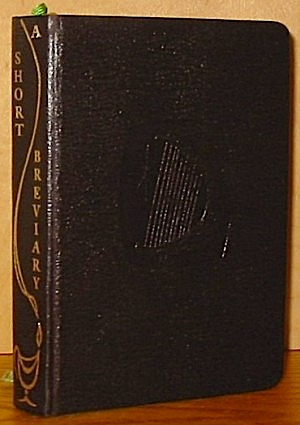Praying with Christ and His Church
 Father, Would You Pray for Me?
Father, Would You Pray for Me?
Every day, without exception, people ask me to pray for them, sometimes with a quiet word, sometimes by ringing the monastery, sometimes in an email. “Father, would you pray for me?” The intentions are varied; the vast majority of them have to do with illnesses of mind or body, but there are others as well . . . a priest in distress, a marriage in crisis, issues of alcoholism, addiction, unemployment, and the return to the faith of dear children and grandchildren. With so many intentions entrusted to my prayer, how do I go about bringing them before Our Lord?
The Divine Office
Over the years I have discovered that the Divine Office gives expression to every need, seeks healing for every infirmity, and beseeches God for the graces needed in all circumstances. For example, I pray daily for one dear friend who struggles with unrelenting sufferings of body, mind, and soul. “The Lord will guard thee from all evil; the Lord will protect thee in danger; the Lord will protect thy journeying and thy home-coming, henceforth and for ever. I do this at the Hour of Tierce when we chant Psalm 120. Every verse of this psalm relates to my friend and becomes my heartfelt supplication for him.
Thy Journeying and Thy Home-coming
1 I lift up my eyes to the hills, to find deliverance;
2 from the Lord deliverance comes to me,
the Lord who made heaven and earth.
3 Never will he who guards thee allow thy foot to stumble;
never fall asleep at his post!
4 Such a guardian has Israel,
one who is never weary, never sleeps;
5 it is the Lord that guards thee,
the Lord that stands at thy right hand to give thee shelter.
6 The sun’s rays by day, the moon’s by night,
shall have no power to hurt thee.
7 The Lord will guard thee from all evil;
the Lord will protect thee in danger;
8 the Lord will protect thy journeying and thy home-coming,
henceforth and for ever. (Psalm 120:1–8)
This morning at Matins, as we chanted psalm after psalm, I was struck by the number of verses that applied very directly to the circumstances of souls who had asked me to pray for them:
Thou Wilt Shew Me the Way of Life
7 Blessed be the Lord, who schools me;
late into the night my inmost thoughts chasten me.
8 Always I can keep the Lord within sight;
always he is at my right hand, to make me stand firm.
9 Glad and merry am I, heart and soul of me;
my body, too, shall rest in confidence
10 that thou wilt not leave my soul in the place of death,
or allow thy faithful servant to see corruption.
11 Thou wilt shew me the way of life, make me full of gladness in thy presence;
at thy right hand are delights that will endure for ever.
I Claim Thy Pity
15 On the Lord I fix my eyes continually,
trusting him to save my feet from the snare.
16 Pity me, Lord,
as thou seest me friendless and forlorn.
17 Quit my heart of its burden,
deliver me from my distress.
18 Restless and forlorn,
I claim thy pity, to my sins be merciful.
19 See how many are my foes,
and how bitter is the grudge they bear me.
20 Take my soul into thy keeping;
come to my rescue, do not let me be disappointed of my trust in thee.
21 Uprightness and purity be my shield,
as I wait patiently, Lord, for thy help. (Psalm 24:15–21)
Prayer from the Lips of the Son
One who prays the Divine Office, be he a monk, a priest, or a layman, is certain of interceding for the persons and intentions confided to him in utterances inspired by the Holy Ghost, in words that the Father receives from the lips of the Son, the Head of Mystical Body and High Priest of His Church. This is undoubtedly one of the reasons why Frank Duff, the founder of the Legion of Mary, committed himself to the daily recitation of the Divine Office, and never missed it.
It was fifty years ago that my Dad bought me my first breviary. It was the excellent Short Breviary then edited by The Liturgical Press. The introduction, commentaries, and notes were by Dom Pius Parsch. The Austrian Canon Regular of Klosterneuburg brought the Christological content of the psalms to life for me. Pius Parsch taught me how to apply the antiphons and psalms to the life of the Church, to the suffering members of Christ, and to the pressing needs of priests labouring in the vineyard. The psalms became my daily bread and, since that time, I have been unable to live without the sustenance they provide. (Let it be said, in passing, that the Collegeville Short Breviary surpassed by far all later attempts at making the Divine Office accessible to layfolk.)
I Do Pray for You
Know, then, that when you ask me to pray for you, I do just that. I pray for you in the words that Mother Church places in my heart and on my lips. The Father, hearing the psalms composed for His Word and fulfilled in His Word, is moved to pity at the pleas that, in this way, rise before Him like incense.
I Will Sing of Thy Praise
1 My heart’s thanks, Lord,
for listening to the prayer I uttered;
angels for my witnesses, I will sing of thy praise.
2 I bow down in adoration towards thy sanctuary,
praising thy name for thy mercy and faithfulness;
thy own honour and thy pledged word
thou hast vindicated for all the world to see.
3 To thee I appealed, and thou didst listen to me,
didst fill my heart with courage. (Psalm 137:1–3)


Beautiful words! Thank you Fr. Prior for your prayers! Yes I think that reading the Liturgy of the Hours is very rewarding to our spiritual life especially praying for each other. I do believe that knowing we are all praying the same words no matter where we live or who we are, increases the strength that Our Lord gives us! May Our Lord continue to bless you and our Brothers at Silverstream!